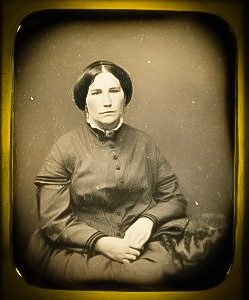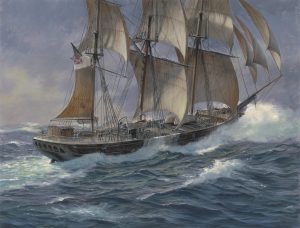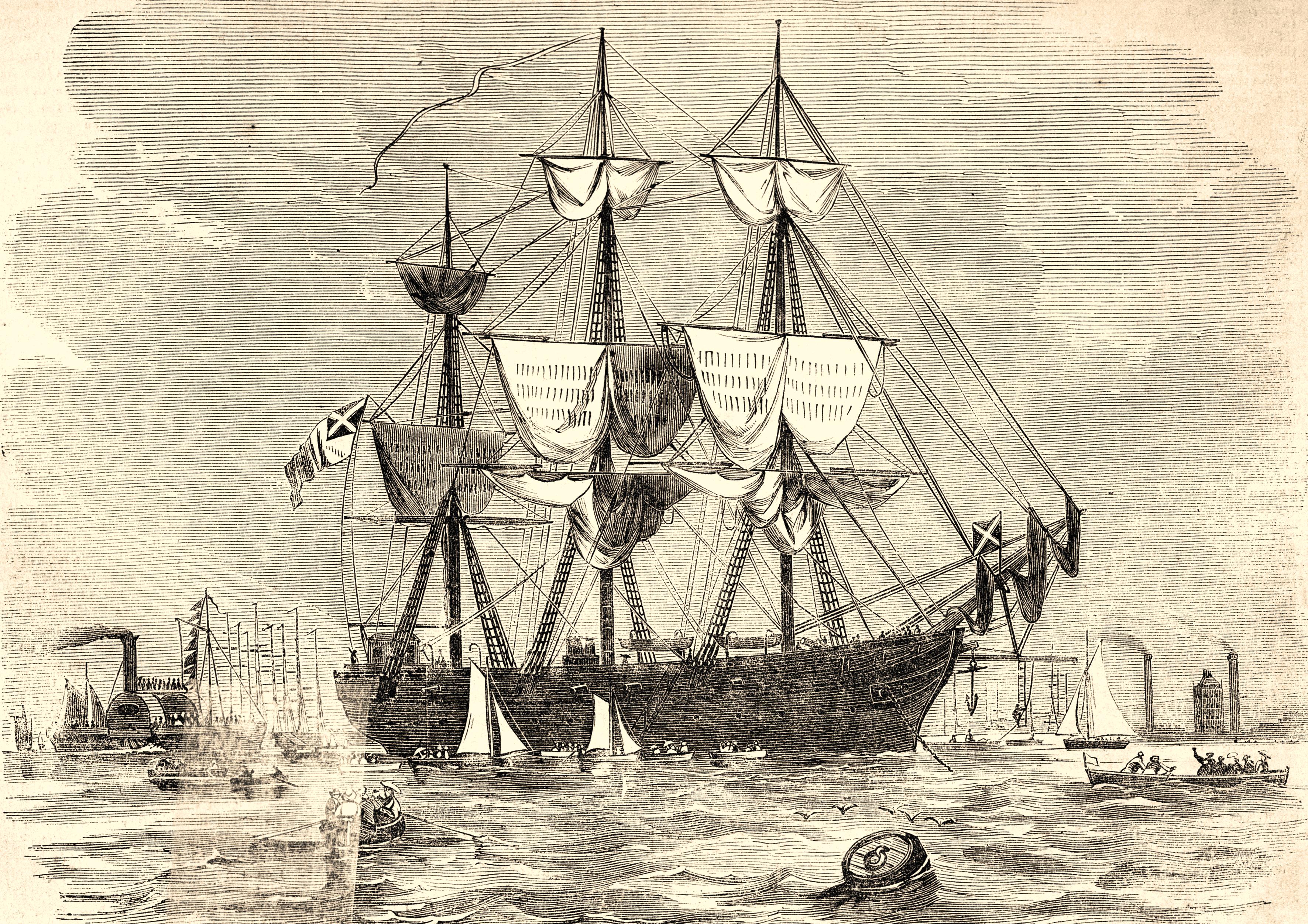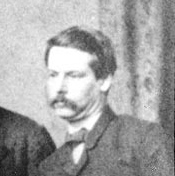From the ECW Archives: Queen of Delphine, Part II

(Continuing the story from Part I of Lillias Nichols as prisoner of war and her captors aboard the CSS Shenandoah.)
New Year’s Day 1865 continued clear and balmy. All sails were set with just enough breeze to fill them, the first really fine weather they had experienced since entering the Indian Ocean.
Mrs. Nichols’s canaries sang delightfully all day. New Year’s dinner in the wardroom included two splendid hams adorned with Confederate flags.
It seemed a pity to cut them, wrote Lieutenant Chew, “however, looking at them was not sufficient for the voracious appetites of some of my messmates.” Hopes for the future were tempered by thoughts of home. “What a waste of waters between me and the shores of my country!”[i]
They had a nice dinner, noted Lieutenant Whittle. “This is a day upon which all persons however separated think of their absent dear ones more than on any other. Oh! How my heart feels for my dear ones.” He invoked God’s blessing and wished for a better and happier new year. “My constant prayer is that a merciful God will guard, protect and cherish our dear country. That he will open the eyes of our enemies to the cruelty of the war they are waging against us and that he may teach them that they are wrong.”[ii]
With the dawn, the near-barren volcanic island of St. Paul rose above the horizon. Masters Mate Hunt claimed to have observed Mrs. Nichols in some distress over the prospect of being marooned there, and to have comforted her. (Hunt had a tendency to embellish his memoirs.)
She told him of stories in the Northern press describing outrages committed upon defenseless men and women by Rebel cruisers, and produced a sample from an illustrated New York publication. The article compared the men of the infamous CSS Alabama with dastardly pirates and renegades, but was, according to Hunt, full of blunders and absurdities that provided amusement in the wardroom for days.[iii]
They dropped anchor at the southern end of the island while eight officers rowed to the beach for a day of exploration and fishing, returning in the evening loaded with fish and in the best of spirits. But they paid dearly, recalled Hunt, with bright sunburns and hands blistered at the oars.
They had hoped to capture a seal or two but failing this, found a penguin and, “brought his aquatic fowlship off in triumph.” The penguin had the bray of an ass, was covered by gray down, and walked with military erectness. Someone pinned a rag around its neck resembling a shawl like an old lady, which amused them all, including Mrs. Nichols. Waddell shaped course for Cape Leeuwin at the southwestern tip of Australia.[iv]

The men (and woman) of Shenandoah settled into underway routine for the next three weeks with everyone anxious to get ashore. Friday, January 6, 1865, was Surgeon Lining’s thirty-first birthday. He enjoyed conversing with Mrs. Nichols and viewing her family photographs, but Captain Nichols got jealous and came poking around whenever the doctor was with her. “The fool and ass…. I shall now go on talking to her to plague him, if nothing else.”
Nichols frequently walked the quarterdeck with his wife, a privilege extended to no other prisoners. According to Hunt, “the old fellow made himself so continually and unmitigatedly disagreeable that our officers perforce avoided him.” They were as anxious to be rid of him as he was to be elsewhere.[v]
Lieutenant Chew noted the crossing of the meridian exactly opposite his home on the globe and was amazed to find himself in such a far off place. He calculated that Melbourne, Australia, and Lexington, Missouri were distant from each other by the Cape of Good Hope 238 degrees of longitude, equal to 12,600 miles.
They had enjoyed summer and fall in Europe and now in the southern hemisphere were having summer over again. “I suppose by the coming of the winter months, we will have [re-]crossed the line, thus having continual summer.”[vi]
Lieutenant William Whittle reported an uncomfortable encounter with Mrs. Nichols one morning in the wardroom:
“Well Mr. Whittle, I trust that we may soon have peace,” she said, a sentiment to which he concurred.
“Do you think we can ever be friends?”
“No Madam, never,” he responded.
“But Mr. Whittle, if after the peace was made you were to meet me, would you speak to me?”
“Certainly, Madam, I would speak at any time to a female.”
“But would you not speak to my husband?”
“I might do so as he has never served against us.”
The lady expressed admiration for the Confederate Navy uniform cap and asked if she could have one. Whittle felt bound as a gentleman to acquiesce; he could say no to men but not to a woman. But they were Yankees, and their motives could only be mercenary. Whittle had no doubt she would hand the cap, if provided, over to her husband and he would sell it.
He thought no woman with so little delicacy as to place a gentleman in such a fix should expect him to comply, “and on this principle I will let the cap alone.” Mrs. Nichols apparently developed a grudging fondness for some of the officers, but never took to the somewhat stuffy Virginian. She undoubtedly enjoyed teasing him.[vii]

A new parole form was prepared for signature by the prisoners before release upon arrival in Melbourne, in which they promised not to serve against the Confederacy, and not to provide information tending to the detriment of the Shenandoah. Captain Nichols signed the form without protest, but not his wife.

“She let loose with her tongue, pitching directly into her husband for telling her to sign it & say nothing,” reported Lining. The lady would not feel bound by parole given under duress and would pass on whatever information she pleased (which she subsequently did to the U.S. Consul in Melbourne).
After signing the document, Mrs. Nichols turned to Lieutenant Lee and pointedly inquired: “Is there anything you want [my son] Phiny to sign?” Lee replied: “No, Madame, we are much more afraid of you than we are of him.” Dr. Lining: “She went out in a towering rage. Not to get the vials of her wrath poured out on me, I kept quiet.”[viii]
On the morning after arrival, Captain Waddell was awakened by voices in the adjoining cabin. Mrs. Nichols was preparing for departure and loudly demanding restitution of every book taken from her ship Delphine. All were returned except Uncle Tom’s Cabin, which Lieutenant Whittle threw overboard.
The lady thanked them for their kindness, declaring she liked all the officers except Doctor Lining and Lieutenant Whittle. “I thought I was a kind of chicken of hers,” concluded the embarrassed lieutenant, “anyhow I was very kind to her.” The Nichols family loaded their luggage into boats and shoved clear of Shenandoah. Her parting shot: “I wish that steamer may be burned.”[ix]
(Extracted from A Confederate Biography: The Cruise of the CSS Shenandoah (Annapolis: Naval Institute Press, 2015) by Dwight Sturtevant Hughes)
[i] Francis Thornton Chew, “Reminiscences and Journal of Francis Thornton Chew, Lieutenant, C.S.N.,” Chew Papers #148, Southern Historical Collection, University of North Carolina Library (not paginated), 1 January 1865.
[ii] William C. Whittle, Jr., The Voyage of the CSS Shenandoah: A Memorable Cruise (Tuscaloosa: University of Alabama Press, 2005), 99.
[iii] Cornelius E. Hunt, The Shenandoah; Or, The Last Confederate Cruiser (New York: G.W. Carelton, 1867), 87-89.
[iv] Ibid., 84-86.
[v] Charles E. Lining, Journal, Eleanor S. Brokenbrough Library, Museum of the Confederacy, Richmond, VA. (not paginated), 6 January 1865; Hunt, Shenandoah, 91.
[vi] Chew, “Reminiscences and Journal,” 12 January 1865.
[vii] Whittle, Voyage, 105-06.
[viii] Lining, Journal, 23 January 1865.
[ix] Whittle, Voyage, 106; James I. Waddell, “Extracts from notes on the C.S.S. Shenandoah by her commander, James Iredell Waddell, C.S. Navy,” in The Official Records of the Union and Confederate Navies in the War of the Rebellion (Washington, D.C.: U.S. Government Printing Office, 1896), 1, 3:809.
Great post! Never mess with a Down Easter!
Excellent story. Do you know how the Nichols family fared when they returned to the U.S.?
Rob,
Sorry for delay in responding and thanks for the comment. It would be interesting to know, but I have not had a chance to research their fate. Given Mrs. Nichols’s strength of character, I suspect they did fine.